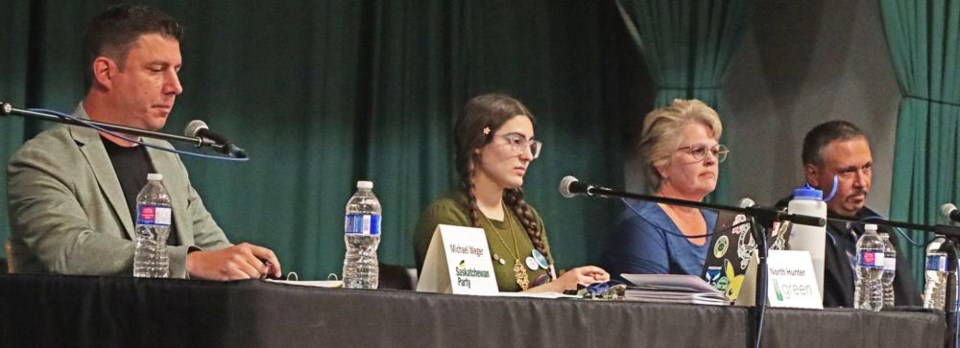WEYBURN - The fears of splitting votes had an impact on how people cast their ballots, said first-time candidate Rose McInnes, who ran for the Sask. United Party in the provincial election in the riding of Weyburn-Bengough.
She ended in third place just behind Seth Lendrum of the NDP, with 1,067 votes to Lendrum’s 1,490 votes. The seat was won by Mike Weger of the Saskatchewan Party, also a first-time candidate, with 5,595 votes.
North Hunter of the Green Party received 110 votes, and Andrew Shanaida of the Buffalo Party received 88 votes.
With 13,868 registered voters in Weyburn-Bengough, this translates to a 60.21 per cent voter turnout, higher than the provincial numbers.
Provincially, the Sask Party formed another majority government, with 35 seats in the Legislature and the NDP with 26 seats, and no other party elected any candidates in the 61 seats available.
The Sask Party garnered 232,760 or 53 per cent of the vote, while the NDP had 173,285 or 39.5 per cent of the vote. Provincially, a total of 53 per cent of eligible voters cast a ballot. Mail-in ballots were to be counted Oct. 30, and the final vote tally will be done by Nov. 9.
“For a first-time election of a new party, and myself as a new candidate who has never entered politics, I feel the poll showed that there is something lacking in the current government,” said McInnes.
“We know vote splitting was a huge issue for many people, so I feel that was reflected in the numbers,” she added.
One of the issues that was important to her is the proposed wind turbines for the RMs of Weyburn and Griffin, and McInnes said she would continue helping those residents who oppose this project from going ahead.
“I will continue С����Ƶ a voice for those opposed to the wind turbines in this constituency, and not just the RM of Weyburn No. 67, but the proposed Lajord spot and possibly Avonlea. The legal petition is still С����Ƶ signed, and this issue needs to be addressed. I am hoping Mr. Weger will look at the many pages of petition signatures, and consider presenting it at the Legislature,” said McInnes.
Asked if she might consider running for election again in the future, she said, “If I am asked to run again, I will. I had more than 1,000 votes in under three months, and I can’t turn my back on that.”
McInnes felt her campaign went well overall, and the only thing she would change would be to have more time.
“For the just over two months time I had, we made huge strides in getting the Sask. United Party policies into people’s view. We had so much positive feedback, but there were a lot of worried voters regarding split votes,” she said. “We gave 100 per cent in this election, and wouldn’t change a thing, but to have more time.”
For his part, Weger said he stepped up his game, because he knew McInnes and the Sask United Party were also out knocking on doors and talking to people.
He said he could not rely on what former С����Ƶ Dustin Duncan had done, as he had huge name recognition in the riding while this was Weger’s first time to run as a candidate.
“I know that Ms. McInnes and the Sask United Party was out doing some good work. Competition is good, I like it, and I think it helped me make sure we were focused,” he said.
Weger noted he met a lot of residents in his campaigning, but knows there many more constituents he has yet to meet, which he plans to do as the С����Ƶ.
“I feel like for the last 16 years, we have lent our С����Ƶ to the province. Dustin had many high-profile roles as a minister. I hope for the next four years I can be the С����Ƶ in this constituency where everyone sees me around and takes the chance to walk up to me. I’ll be there to listen, and will be their voice when I go up to Regina,” he said, noting the two most important issues to people he talked to were health care and education.






